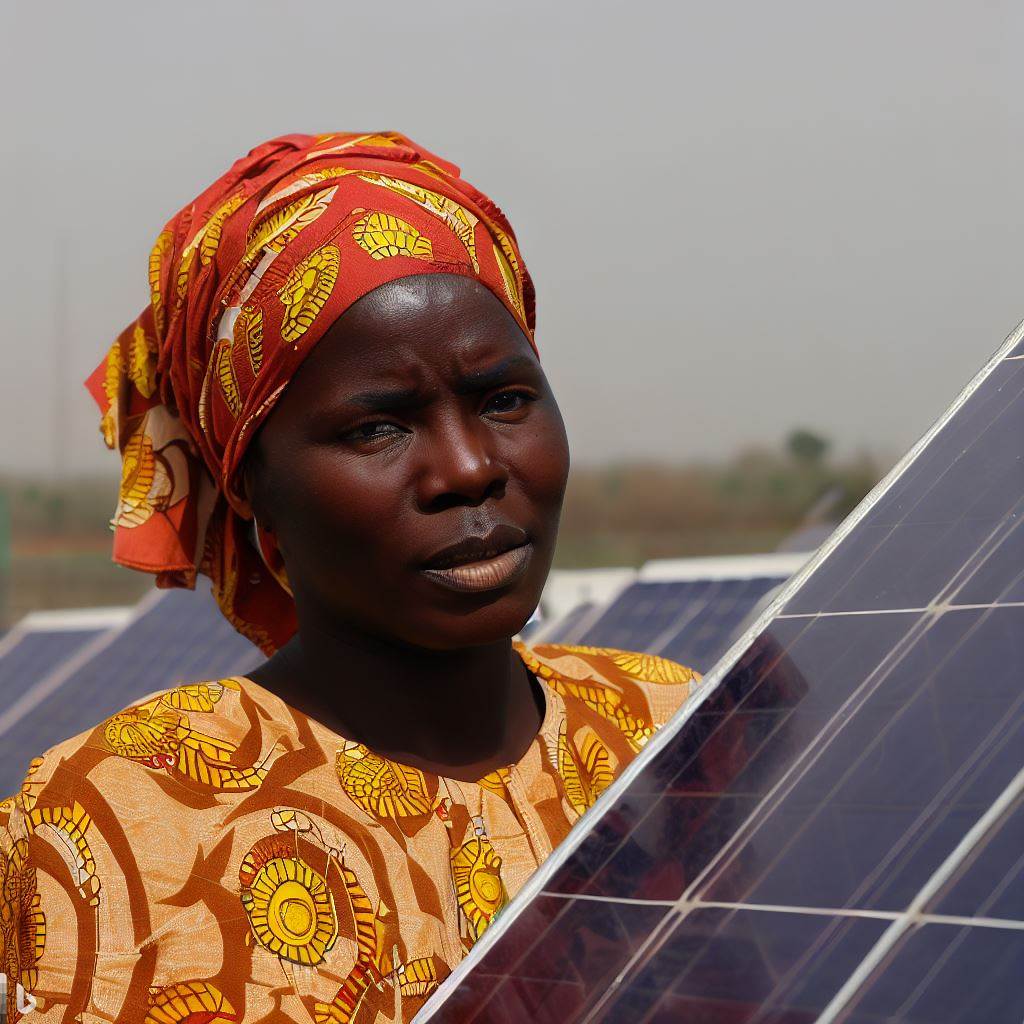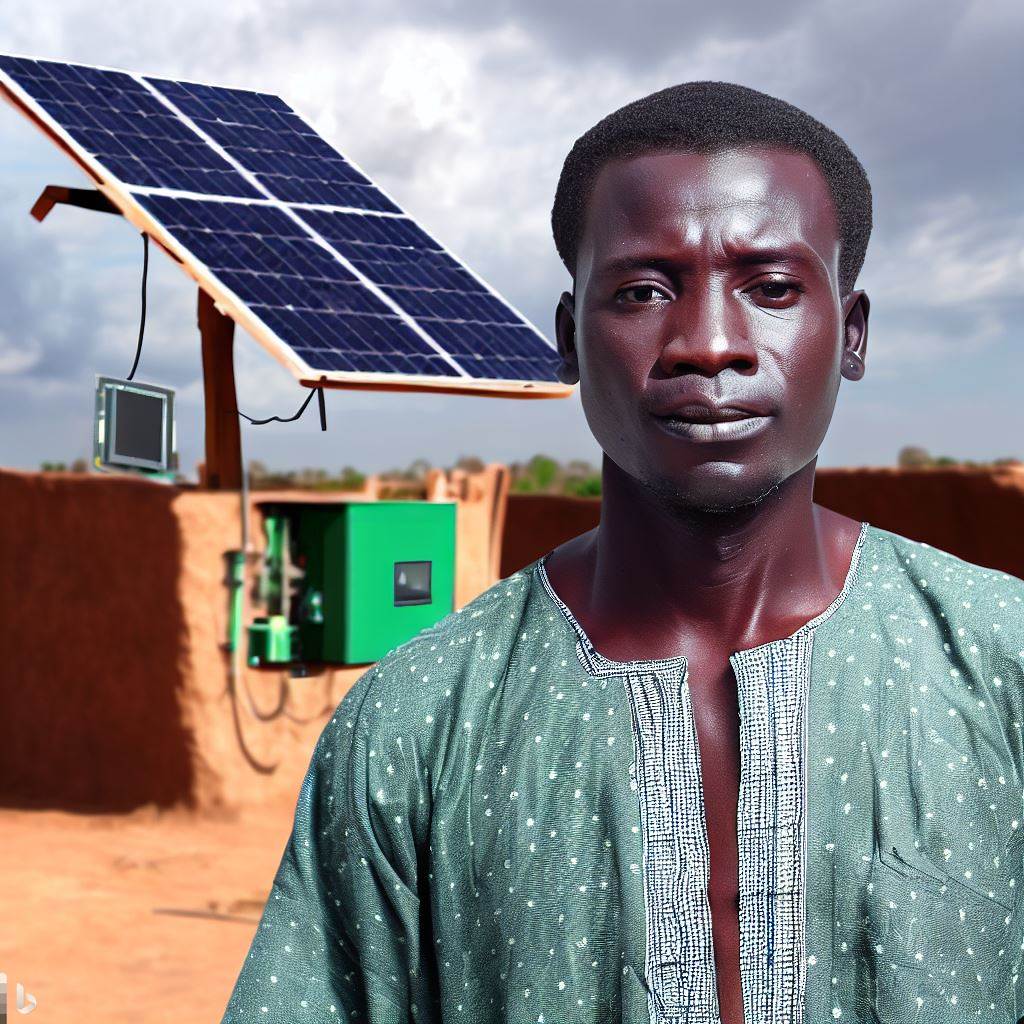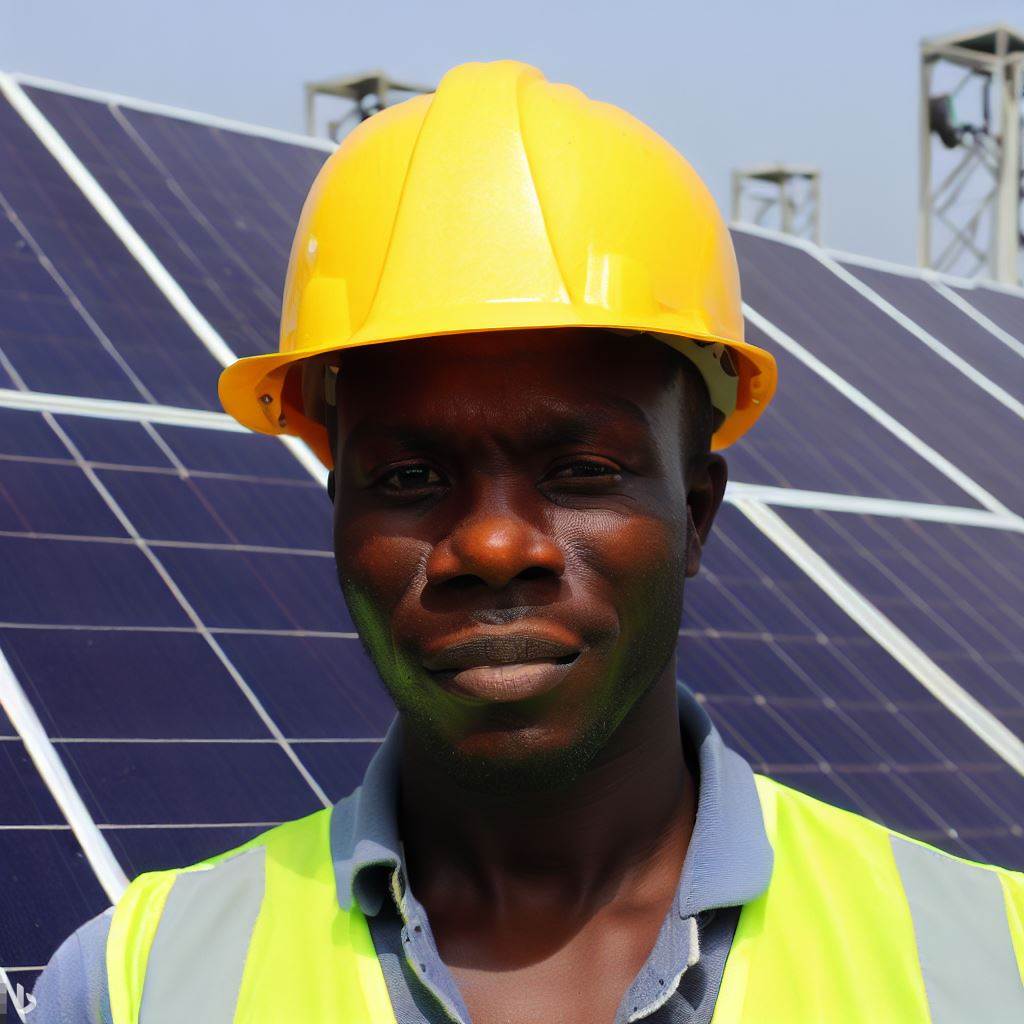Introduction
A. Women’s Role in Solar PV Installation
Women are making significant strides in the male-dominated field of solar PV installation, reshaping the industry.
B. Focus on Nigeria’s Scene
In this section, we zoom in on Nigeria, where women are breaking barriers and driving solar energy adoption.
The Importance of Solar PV Installation
Solar energy’s global importance is rising due to its clean, renewable nature that reduces reliance on fossil fuels.
Benefits of solar PV installation in Nigeria encompass:
- Energy Access: Extending electricity to remote, off-grid areas, improving living standards.
- Job Creation: Employment and entrepreneurship opportunities, especially for women, in the solar industry.
- Economic Growth: Stimulating development and attracting foreign investment.
- Affordable Electricity: Providing cost-effective options, alleviating burdens on low-income households and small businesses.
- Environmental Sustainability: Clean energy reducing greenhouse gases, fostering a healthier environment, and combating climate change.
- Energy Independence: Less dependence on fossil fuel imports, striving towards self-sufficiency.
In general, solar PV installation’s global importance lies in its clean, renewable nature and reduced reliance on fossil fuels.
In Nigeria, it offers benefits such as expanded energy access, job creation, economic growth, affordability, sustainability, and energy independence.
Embracing solar energy can drive development and empower communities, especially women, in the solar industry, leading to a sustainable and prosperous future.
Current State of Solar PV Installation in Nigeria
The solar PV industry in Nigeria is growing, with over 40 companies operating, driven by the country’s immense solar energy potential.
Solar PV currently contributes less than 1% of Nigeria’s electricity, but the government aims for 30% from renewables by 2030.
This ambitious target has created opportunities for women to enter the sector.
Women participate as entrepreneurs and skilled professionals in solar PV.
The Nigerian Energy Support Programme (NESP) empowers women through capacity-building and financial assistance.
Challenges persist, including limited access to finance and contracts, gender bias, and lack of inclusive policies.
Awareness and support are gradually changing this landscape.
Diverse perspectives and skills make women essential to the sector’s growth and success.
Equal access to training, financing, and opportunities must be ensured.
Gender-responsive policies and practices should promote women’s advancement.
Empowering women in solar PV installation benefits employment, poverty reduction, and gender equality.
Supporting women in the sector accelerates Nigeria’s transition to sustainable energy.
Women in solar PV installation can be catalysts for positive change in the energy sector.
Read: Salary Insight: What Beauty Therapists Earn in Nigeria
Gender Gap in the Solar PV Industry
The solar PV installation sector in Nigeria, like many others, faces a significant gender gap, limiting diversity and equality.
Several reasons contribute to this gender gap:
- Lack of Awareness and Education: Women often lack awareness of solar PV career opportunities due to limited access to education and training.
- Societal and Cultural Norms: Deep-rooted gender stereotypes discourage women from non-traditional careers.
- Limited Representation: Few women role models in the field discourage aspiring female professionals.
- Discrimination and Bias: Women in the industry face discrimination, bias, and limited career growth opportunities.
To address the gender gap:
- Promote Awareness and Education: Raise awareness through campaigns, vocational training, and scholarships targeting women.
- Challenge Gender Stereotypes: Challenge societal norms to expand women’s career choices.
- Supportive Policies and Programs: Implement gender diversity policies, mentorship programs, and networking opportunities.
- Highlight Female Role Models: Showcase successful women to inspire and motivate aspiring professionals.
Closing the gender gap in solar PV installation is vital for sustainable development and industry innovation.
Empowering women will lead to a more diverse and inclusive sector, driving economic growth.
Read: Top Beauty Therapy Schools in Nigeria: Enroll Today
Challenges Faced by Women in Solar PV Installation
Women who pursue careers in solar PV installation encounter various barriers and obstacles in Nigeria.
These challenges are influenced by societal, cultural, and economic factors.
1. Gender Stereotypes and Discrimination
- Women face stereotypes that associate manual labor, such as PV installation, with men.
- They often encounter discrimination in recruitment, job opportunities, and promotions.
- Gender biases undermine their abilities, limiting their growth in the industry.
2. Lack of Access to Education and Training
- Many women lack access to quality education and training in solar PV installation.
- Inadequate educational infrastructure and limited opportunities hinder their skill development.
- This lack of training limits their employability and advancement in the field.
3. Cultural Norms and Expectations
- Traditional gender roles and expectations discourage women from pursuing careers in technical fields.
- Societal pressure to prioritize family responsibilities often impedes their professional aspirations.
- Cultural norms limit their mobility and restrict their ability to work in remote locations.
4. Limited Representation and Role Models
- The underrepresentation of women in solar PV installation discourages aspiring females.
- The absence of female role models makes it difficult for women to envision themselves in the field.
- Without visible representation, women may hesitate to enter or persist in the sector.
5. Financial Constraints
- Women often face economic challenges that hinder their involvement in solar PV installation.
- They may lack access to financing options or struggle with limited financial resources.
- Expensive training programs, tools, and equipment make it difficult for women to enter the field.
6. Work Environment and Safety Concerns
- Hostile or male-dominated work environments create discomfort and safety concerns for women.
- Inadequate safety measures and harassment can deter women from pursuing careers in PV installation.
- The physical demands of the job may also pose challenges for women.
7. Limited Networking and Support Systems
- Women often face isolation in the solar PV industry due to a lack of networking opportunities.
- Male-dominated networks and professional associations can exclude them from vital resources.
- The absence of support systems hinders women’s professional development and advancement.
8. Inadequate Policies and Supportive Programs
- Nigeria lacks comprehensive policies and programs addressing gender equality in the renewable energy sector.
- The absence of supportive initiatives restricts women’s access to training and employment opportunities.
- Government and industry efforts are crucial to address these gaps and promote women’s inclusion.
The challenges faced by women in solar PV installation in Nigeria are significant, but steps can be taken to overcome them.
By addressing gender stereotypes, enhancing educational opportunities, promoting women’s representation, and implementing supportive policies, Nigeria can empower women to thrive in this growing sector.
Read: Becoming a Beauty Therapist in Nigeria: A Comprehensive Guide

Promoting Gender Equality in Solar PV Installation
The solar PV industry in Nigeria has historically been male-dominated, but there is a growing recognition of the need to empower women and promote gender equality in this sector.
Several initiatives and programs have been launched to support women in pursuing careers in solar PV installation, paving the way for their success and inspiring others in the process.
A. Initiatives and Programs Empowering Women in the Solar PV Industry
- Women in Renewable Energy Nigeria (WIRE-NG): WIRE-NG is an organization dedicated to empowering women in renewable energy, including solar PV.
They provide training, mentorship, and networking opportunities to women who are interested in pursuing careers in the solar PV industry. - Solar Sister: Solar Sister is a social enterprise that trains and supports women entrepreneurs to distribute solar products, including solar PV installations, within their communities.
This program not only promotes gender equality but also helps to expand access to clean energy in remote areas. - UN Women’s Empowerment Principles: The United Nations (UN) has developed a set of principles to guide businesses in promoting gender equality and women’s empowerment.
Many solar PV companies in Nigeria have committed to implementing these principles in their operations, creating a more inclusive and supportive work environment. - Government Support: The Nigerian government has recognized the importance of gender equality and has implemented policies to support and encourage women’s participation in the solar PV industry.
These policies include providing loans and grants specifically for women-owned solar businesses and promoting gender-sensitive training programs.
B. Success Stories of Women in Solar PV Installation
- Funke Adeoye broke barriers, rose to prominence in Nigeria’s solar PV industry, mentors women, and advocates gender equality.
- Amina Mohammed, despite starting with limited knowledge, became a skilled solar PV technician, inspiring women to overcome challenges.
- Bola Solarin founded a training center, empowering women with solar PV installation skills, enabling them to excel in the industry.
These women’s success stories prove women’s potential in solar PV installation and promote gender equality.
Their achievements address Nigeria’s energy needs, support sustainable development, and advance equal representation.
Still, efforts from government, organizations, and private sectors are needed to ensure gender equality in the solar PV field.
Continued support and awareness campaigns will create opportunities for aspiring women in this growing sector.
Promoting gender equality in solar PV is vital for building an inclusive, sustainable future.
Initiatives and success stories inspire women, break barriers, and foster a thriving industry for all.
Read: Customer Service Skills for Bartenders in Nigeria
Case Studies of Successful Women in Solar PV Installation in Nigeria
- Adaeze Okoye founded Solar Solutions Ltd., a leading solar energy provider in Nigeria, revolutionizing the industry.
- Fatima Mohammed co-founded SolarTech Ltd., focusing on supplying solar power systems to off-grid communities.
- Aminat Ibrahim, from intern to project manager at SolarWorks!, contributes to major solar projects in Nigeria.
- Nneka Okeke established Solar Queens, empowering rural women as solar PV installers, impacting over 100 lives.
- Oluwatosin Adesanya founded Solar Women Nigeria, supporting and mentoring women pursuing solar energy careers.
These women have transformed Nigeria’s solar PV industry, spreading clean energy access and breaking gender barriers.
Adaeze Okoye’s Solar Solutions Ltd. democratizes solar energy access, benefiting households and businesses across Nigeria.
Fatima Mohammed’s SolarTech Ltd. illuminates off-grid communities, improving living conditions in underserved areas.
Aminat Ibrahim’s leadership at SolarWorks! drives large-scale solar projects, contributing to Nigeria’s sustainable energy transition.
Nneka Okeke’s Solar Queens empowers rural women, bridging gender gaps and fostering solar industry growth.
Oluwatosin Adesanya’s Solar Women Nigeria inspires and supports women, promoting diversity and innovation in solar energy.
These trailblazers exemplify women’s impactful roles and inspire others to join Nigeria’s dynamic solar PV installation sector.
Future Outlook and Opportunities
The solar PV industry in Nigeria is rapidly growing, offering women a chance to excel:
- Changing attitudes empower women to pursue careers in solar PV installation, breaking cultural barriers.
- Government policies actively support women’s participation, providing training and financial aid.
- Emerging financial trends, like microfinance and impact investment, target women-led solar PV businesses.
- Skills development programs equip women with technical expertise, fostering industry entry.
- Entrepreneurship opportunities are rising, backed by support services and networking.
- Collaboration among stakeholders fosters growth and addresses challenges effectively.
- Women’s participation creates jobs, stimulates economic growth, and aids sustainable development.
- A growing market demand for solar PV installations presents favorable opportunities.
- Technological advancements empower women to contribute to innovation and industry development.
See Related Content: Nigeria’s Transit System: A Guide to Bus Fare Structures
Conclusion
This blog post has highlighted the current state of women in solar PV installation in Nigeria.
Women face numerous challenges in this sector including cultural norms, lack of training opportunities, and limited access to finance.
However, it is crucial to recognize the importance of gender equality and inclusivity in the solar PV installation sector.
By promoting equal opportunities for women, Nigeria can tap into a significant pool of talent and expertise, accelerating the growth of the renewable energy industry.
To achieve this, it is necessary to address the barriers that prevent women from participating fully in this sector.
This requires targeted policies and interventions that promote gender equality, provide training opportunities, and offer financial support to women entrepreneurs.
The involvement of women in solar PV installation will not only bring about economic empowerment but also contribute to sustainable development and climate change mitigation.
It is essential to recognize the valuable contribution women can make in this field.
Ultimately, Nigeria must strive for a more inclusive solar PV installation sector by breaking down barriers and providing equal opportunities for all individuals, regardless of gender.
Only then can we truly harness the potential of renewable energy and create a more sustainable future.




